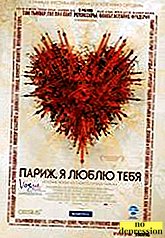Creaking teeth in a dream is not such a rare occurrence that occurs in adults and in children.
Those who have experienced this symptom know what discomfort is the sound of creaking teeth sleeping person.
Why do teeth gnash in a dream? How to detect this symptom in yourself and what to do in this case?
Gnashing in a dream teeth - what is it?
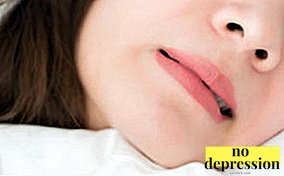
Creaking teeth in a dream is called bruxism (from Greek βρυγμός - gnash).
Attacks appear during sleep and usually last for a short time, less than a minute.
During them, the chewing muscles of the person are reduced, the teeth are pressed to each other with considerable effort, which causes a characteristic gnash.
Bruxism is observed most often in children - almost every 3-5th child.
Much less often, it occurs in adults - as a rule, after seven years of age, this symptom disappears.
Causes of creaking in children and adults
Why or what do teeth grit in a dream? Causes of Bruxism in Childrencan be both psychological and physiological in nature:
- Malocclusion, pathologies of development of the jaw joints, as well as their diseases.
- During the change of milk teeth to the molars, when a child erupts, they may be disturbed. discomfort and itching. In an attempt to scratch their teeth, the child will creak. At the same time, the appearance of daytime bruxism is also possible.
- Heredity - if one of the parents had a symptom, it is likely that it will manifest itself in the child.
- Colds, runny nose, inflammatory processes in the ears, which hamper nasal breathing.
- Lack of solid food in the diet of the child and, as a result, an insufficient load on the jaw.
- Insufficient intake of trace elements in the body, which led to disruption of the central nervous system.
- Nightmares, sleepwalking, and other sleep disturbances.
- Stress, feelings, big emotional stress.
- Violations of the usual rest and sleep mode.
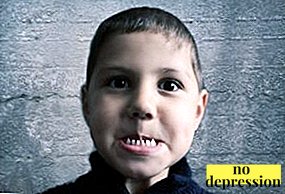
In adults, bruxism is observed to a lesser extent than in children - 5-10% of older people are affected.
Causes of squeak may be as follows.:
- Strong emotional distress and stress.. Experienced negative emotions can affect the quality of sleep, cause nightmares and cause this symptom.
- Lack of restchronic fatigue and lack of sleep.
- Abuse alcohol, frequent smoking and consumption of CNS stimulants - for example, coffee or tonic beverages.
- Malocclusion, inflammation of the teeth and the resulting jaw discomfort.
- Some neurological diseases - Parkinson's disease, epilepsy.
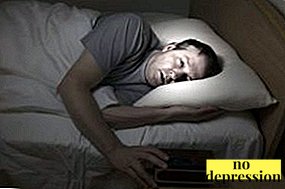
During bouts of bruxism, a person not only grit his teeth, but their knocking them, clapping, clenching jawsmakes them chewing movements.
At the same time, blood pressure rises, sleep becomes restless, breathing and pulse increase.
The reasons for knocking teeth in a sleeping person are the same as in the characteristic rattle - all this is a manifestation of bruxism.
How to check?
The movements of the sleeping man's jaws are unconscious, uncontrollable, so he may not even be aware of bruxism. Most often, this is reported to him by relatives and friends..
However, for some indirect indications, this symptom can be diagnosed in oneself and independently:
- Changing the shape of teeth, their erasure.
- Painful sensations in the temporomandibular joints.
- Poor quality of sleep - a person can suddenly wake up without a reason.
- Morning headaches.
- Sensation of discomfort when biting, itching in the jaws.
- Painful or unpleasant sensations in the ears and sinuses.
- Unpleasant sensations or pain when moving eyes.
- Involuntary spasms of the jaw muscles.
- Painful sensations in the facial muscles.
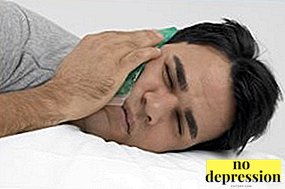
The presence of several of the above symptoms may indicate that a person has a predisposition to bruxism.
What to do?
Long-term bruxism can lead to the following complications:
- chronic fatigue;
- erasing tooth enamel, the appearance of sensitivity to hot and cold food;
- loosening of teeth, the formation of microcracks in them;
- head and jaw pain due to masticatory muscle overload.

If bruxism is periodically observed in a child under the age of seven, this may not be emphasized.
For prophylaxis, you can visit the dentist, ENT and neuropathologist. As a rule, over time in children such a symptom disappears itself.
With constant night gnashing of a child treatment may be prescribed:
- Treatment of diseases of the oral cavity, eliminating the effects of night rattle.
- Reception of medicines. As a rule, these are drugs that soothe the central nervous system and normalize sleep, as well as B vitamins.
- Physiotherapy - warm compresses on the face, soothing baths, massage of the maxillofacial muscles.
- Putting on a special mouth guardwith which the child is sleeping. It prevents tooth friction and the destruction of enamel. It is selected individually, taking into account the structure of the teeth and oral cavity for each child.
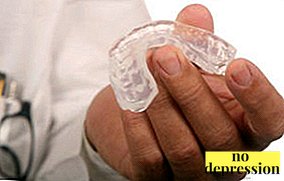
Sometimes kapu is also used to diagnose bruxism and the severity of its consequences.
An adult who grinds his teeth in a dream should consult a dentist in order to eliminate possible complications from friction, as well as a neuropathologist if a disease of this nature is suspected.
How to stop creaking?
How to get rid of the gnashing of teeth to her husband or child?
In order for the child not to grind his teeth in a dream, you should take the following preventive measures:
- Set clear day mode. The child should eat, rest, sleep and engage in any activity at a specific time. This will lead to improved sleep and reduced likelihood of bruxism.
- Revise the child's diet. It is necessary that it contains all the required nutrients, vitamins and trace elements. It is also necessary to observe the diet for better digestion of food.
- Ensure that the diet solid food was present - for example, apples, raw carrots. This will create a strain on the chewing muscles and will lead to their greater relaxation during sleep.
- Maximum eliminate stress and negative emotions of the child. The atmosphere in the family should be appropriate.
- Exclude too bright emotional outbursts The child has.
- Be sure to conduct preparation before bed. An hour or two before him to eliminate outdoor games, going to a more relaxed activity - reading a book, picking up puzzles, etc.
An overexcited child may experience restless sleep, which can provoke bruxism.

To an adult The following methods will help a person suffering from bruxism:
- During the day, you need to pay attention to in what position are the jaws. When involuntary contraction of the masticatory muscles should weaken them.
- Eliminate excessive stress on the body, alternate work with rest. Follow the daily routine.
- Practice relaxing exercises - yoga meditationlistening to relaxing music in a relaxed state.
- Avoid stressful situations and negative emotions. Do not provoke conflicts.
- Exclude from the diet tonic drinks - coffee, strong tea, energy.
- Do not abuse alcohol and smoking.
- In the daytime, give the jaws an increased load - for this you can use regular chewing gum. It should be chewed first with one side of the jaw for about 10-15 minutes, then move to the other.
Tired jaw muscles will relax better during sleep.
- Just before falling asleep, apply warm compress on the face in the area of the cheekbones with a duration of 15-20 minutes.
- May I help relaxing massage body and facial muscles for 10–15 minutes before falling asleep.

Since bruxism in an adult is most often caused by the disruption of the central nervous system, soothing drugs will help:
- Valeriana Preparations - tincture of valerian root or its extract in tablets. They have a mild sedative effect, improve the quality of sleep. Side effects can be some reduction in performance, as well as sleepiness during the day.
- Novo Passit. Combined herbal preparation with sedative effect. It also has a calming effect, when it is taken, a person falls asleep faster and stronger. As side effects can also be noted drowsiness and lethargy during the daytime.

The treatment of bruxism in adults can be quite long - usually it takes several months. Only after long-term therapy can positive changes be expected.
Bruxism can not only lead to tooth decay, but also be a symptom that signals a disorder of the central nervous system, so when it is detected, you should first of all worry about identifying and eliminating the causes that can cause it.
How to stop gritting teeth in a dream:

